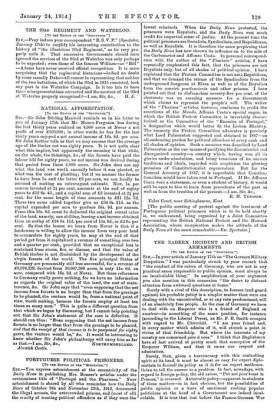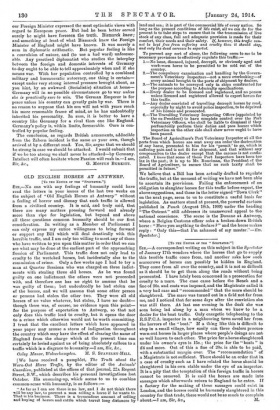THE ZA.BERN INCIDENT AND BRITISH ARMAMENTS. [To an Herron or
Too ..srecriros."1 Sia,—In your article of January 17th on "The German Military Despotism" I was particularly struck by your remark that "the conduct of the rulers of Germany, who are not in any
practical sense responsible to public opinion, must always be an incalculable thing." In amplification of your argument you also mention in this connexion "the desire to distract attention from awkward questions at home."
Surely with a rival of this description, to foresee (and guard against) his probable policy is a simpler matter than were one dealing with the uncontrolled, or at any rate predominant, will of an absolutely free people. In the case of Germany we have to deal with an Emperor who is a friend of England en amateur—in something of the same position, for instance (according to the Liberal Press), as Mr. F. E. Smith occupies with regard to Mr. Churchill "I am your friend and, in every matter which admits of it, will stretch a point in virtue of that friendship. But where the intermits of my country are concerned mire a vows." I think that Englishmen have at last arrived at pretty much that conception of the Emperor William, and that it earns our respect and admiration.
Surely, then, given a bureaucracy with this controlling
spirit at its head, it must be almost as easy for expert diplo- matists to foretell its policy as it is for an expert mathema- tician to tell the answer to a problem. In fact, nowadays, with regard to foreign policy, the old axiom, "Put not your trust in Princes," is reversed. Autocratic policy—apparent to students of these matters—is in fact obvious, but the possibilities of public, opinion or a wave of sentiment rushing popular politicians at the head of a Government are indeed incal- culable. It is true that just before the Franco-German War our Foreign Minister expressed the most optimistic views with regard to European peace. But had he been better served surely be might have foreseen the truth. Bismarck knew; and something at least of what Bismarck knew the Foreign Minister of England might have known. It was merely a sum in diplomatic arithmetic. Bat popular feeling is like a convulsion of nature, and (to use a bad word) unforesee- able. Any practised diplomatist who studies the interplay between the foreign and domestic interests of Germany to-day ought to be able to tell approximately when and if she means war. With her population controlled by a combined military and bureaucratic autocracy, one thing is certain— except under very strong internal pressure brought about, as you hint, by an awkward (Socialistic) situation at home— Germany will in no possible circumstances go to war unless she is practically sure lo win. The German Emperor is for peace unless his country can greatly gain by war. There is no reason to suppose that his son will not with years reach his more reasonable frame of mind, as he has undoubtedly inherited his personality. In sum, it is better to have a country like Germany for a rival than one like England. Germany's policy is, within limits, foreseeable. Ours is con- trolled by popular feeling.
The conclusion, as regards British armaments, adducible from the Zabern incident is the same as your own, though arrived at by a different road. You, Sir, argue that we should be strong in case we should be attacked. I would submit that if we be too strong we shall never be attacked—by Germany. Intellect will often hesitate where Passion will rush in.—I am,







































 Previous page
Previous page